
Legal documents, tax status, accounting practices are highlighted here. Submit your story or comments to webmaster at salamandersociety dot com. Additional sections of the Salamander relating to this topic: Ensign Peak Advisors and LDS Budget

Legal documents, tax status, accounting practices are highlighted here. Submit your story or comments to webmaster at salamandersociety dot com. Additional sections of the Salamander relating to this topic: Ensign Peak Advisors and LDS Budget
Thomas Monson was signing his own name rather than having his minions employ a signature machine to complete legal documents filed in 2015. Documents filed: CERTIFICATE OF AUTHORITY, CHANGE OF REGISTERED AGENT and ARTICLES OF ORGANIZATION OF CORPORATE AGENT SERVICES, LLC.
People who signed these documents or are included within the documents: Thomas S. Monson, incumbent, Pat R. Fought, notary, Robert W. Cantwell, Douglas H. Martin, Gregory N. Tarbet, Cameron M. Hancock, Secretary, Steven C. Penrose, Tiffany M. Runyan, organizer and registered agent of CORPORATE AGENT SERVICES, LLC.
Click here to see these documents: CORPORATION OF THE PRESIDENT OF THE CHURCH OF JESUS CHRIST OF LATTER-DAY SAINTS, a Utah corporation sole - 2015 documents
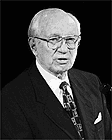 Now, the next question: "Why is the Church in business?"
Now, the next question: "Why is the Church in business?"
We have a few business interests. Not many. Most of these were begun in very early days when the Church was the only organization that could provide the capital that was needed to start certain business interests designed to serve the people in this remote area. We have divested ourselves long since of some of these where it was felt there was no longer a need. Included in these divestitures, for instance, was the old Consolidated Wagon and Machine Company, which did well in the days of wagons and horse-drawn farm machinery. The company outlived its usefulness.
The Church sold the banks which it once held. As good banking services developed in the community, there was no longer any need for Church-owned banks.
Some of these business interests directly serve the needs of the Church. For instance, our business is communication. We must speak with people across the world. We must speak at home to let our stand be known, and abroad to acquaint others with our work. And so we own a newspaper, the Deseret News, the oldest business institution in Utah.
We likewise own television and radio stations. These provide a voice in the communities which they serve. I may add that we are sometimes embarrassed by network television presentations. Our people do the best they can to minimize the impact of these.
We have a real estate arm designed primarily to ensure the viability and the attractiveness of properties surrounding Temple Square. The core of many cities has deteriorated terribly. This cannot be said of Salt Lake City, although you may disagree as you try to get to the Tabernacle these days. We have tried to see that this part of the community is kept attractive and viable. With the beautiful grounds of Temple Square and the adjoining block to the east, we maintain gardens the equal of any in the world. This area will become even more attractive when the facility now being constructed on Main Street is completed and the large Conference Center to the north is finished.
Are these businesses operated for profit? Of course they are. They operate in a competitive world. They pay taxes. They are important citizens of this community. And they produce a profit, and from that profit comes the money which is used by The Church of Jesus Christ of Latter-day Saints Foundation to help with charitable and worthwhile causes in this community and abroad and, more particularly, to assist in the great humanitarian efforts of the Church.
These businesses contribute one-tenth of their profit to the Foundation. The Foundation cannot give to itself or to other Church entities, but it can use its resources to assist other causes, which it does so generously. Millions of dollars have been so distributed. Thousands upon thousands have been fed. They have been supplied with medicine. They have been supplied with clothing and shelter in times of great emergency and terrible distress. How grateful I feel for the beneficence of this great Foundation which derives its resources from the business interests of the Church.
| 1978 letter from IRS to LDS - confirming tax exempt status | 1999 Corp of the Presiding Bishop - confirming tax exempt status | 1923 LDS Articles of Incorporation and 1940 Ammendments - signed by Heber J Grant | 1973 Articles of Ammendment - by Harold B Lee |
| 1998 Temple Corp of LDS Church - Non-Profit Annual Report | 2000 Change of Registered Agent - from Wiford Kirton to Von Keetch that lists several Church business entities | 1997 Amended Restated Articles of Incorportation of the Corporation of the Presiding Bishop - of the Church of Jesus Christ of Latter-day Saints signed by David Burton | 1991 Corporations List - for which Wilford W Kirton, Jr. (senior partner in LDS Church's law firm) is listed as registered agent. |
| 1989 Gordon Hinckley - Ezra Taft Benson - Certificate of Authority | 1989 Thomas Monson - Ezra Taft Benson - Certificate of Authority | Wesley Jones certificate - empowered to execute federal and state tax returns | Wesley Jones certificate - empowered to execute stock, bond, security powers |
| Berne Broadbent - empowered to execute copyrights, trademarks, fees, royalties, intellectual property | Church of Jesus Christ of Latter-day Saints Foundation - Utah Business Entity # 791477-0140 - registered 12/31/1981 current agent Robert W. Edwards |
In the years before his death President Benson suffered from poor health, suffering from blood clots in the brain, strokes, and heart attacks. During this time, Benson almost never appeared in public, and First Counselor Gordon B. Hinckley took on many of Benson's official duties, as he had done as Second Counselor in Kimball's last years. Joining Hinckley in this task was Thomas S. Monson, and the two of them received legal power of attorney to act in Benson's behalf in LDS corporate affairs. Important ecclesiastical and family documents continued to be signed in Benson's name, with the aid of a signature machine.
There was some controversy as to whether Benson's actual mental health during this time was accurately portrayed by the Church. According to Church spokesman Don LeFevre, Hinckley and Monson reviewed major church decisions with Benson in his home, where he was attended by a staff of nurses. However, according to Benson's grandson Steve Benson, who later became a vocal, anti-Mormon critic of the church that he quit, the elder Benson by about 1993 was living in a sweatsuit, fed by others, and incapable of recognizing others or speaking coherently. Steve Benson stated that in a private meeting with apostle Dallin H. Oaks, Oaks explained to the younger Benson that the apostles rotated in pairs each week to visit the elder Benson at the apartment socially, but that Benson was incapable of conducting official business. Other members of the Benson family, who remain devout Latter-day Saints, have distanced themselves from Steve Benson's statements. While it is assumed that Steve Benson is well-intentioned, he has not been a faithful member of the Church of Jesus Christ of Latter-day Saints. Usually it is not best to trust the statements of those against any organization, as they typically slant what they say to cast themselves in the best light possible. Steve Benson is not considered to be an official spokesman for the Church of Jesus Christ of Latter-day Saints. - Wiki - Ezra Taft Benson
The fact that President Benson's counselors did not have a great deal of confidence in his ability to function became evident when documents filed with the state of Utah were examined by the Salt Lake Tribune:
"Documents on file with the state of Utah are strong evidence that the parent corporation of the Mormon Church no longer is being directed by its president, Ezra Taft Benson.
"It is the first time since the corporation was founded 70 years ago that anyone other than the church president has obtained total authority over Utah's most powerful corporation.
"The documents, at the Utah Department of Commerce, were signed with a machine that duplicates the signature of 94 year-old President Benson. They were filed six months before President Benson... made his last public speech.
"Church leaders said this week the filings and the use of a signature machine were routine, and done with President Benson's approval.... Today, the corporation owns all church assets--including a multibillion-dollar portfolio of financial and property holdings....
"Entitled 'Certificates of Authority' and dated May 23, 1989, the documents say Presidents Hinckley and Monson can keep those complete powers--even if President Benson becomes disabled or is determined by a court to be incompetent.... the church made no announcement of the change. It has continued to portray President Benson as the ultimate power behind church affairs....
"Fran Fish, notary public administrator for the state Department of Commerce, said signatures written by machine are legal...
"Still, Ms. Fish... said use of a signature machine on state corporate filings 'is certainly out of the norm.'... Steve Benson... has said that his aging grandfather no longer possesses the mental faculties to handle church affairs.
"'The church has misrepresented the condition of President Benson and stated flatly that his role as prophet has in no way been impeded,' Steve Benson said this week. 'My grandfather has become a storefront mannequin while the business of the store is conducted behind closed doors.'
"He said a signature machine has replaced his grandfather's hand on all personal and family correspondence. 'Evidently,' Steve Benson said, 'the signature machine had not been programmed to sign, 'Grandpa.'"(Salt Lake Tribune, August 15,1993)
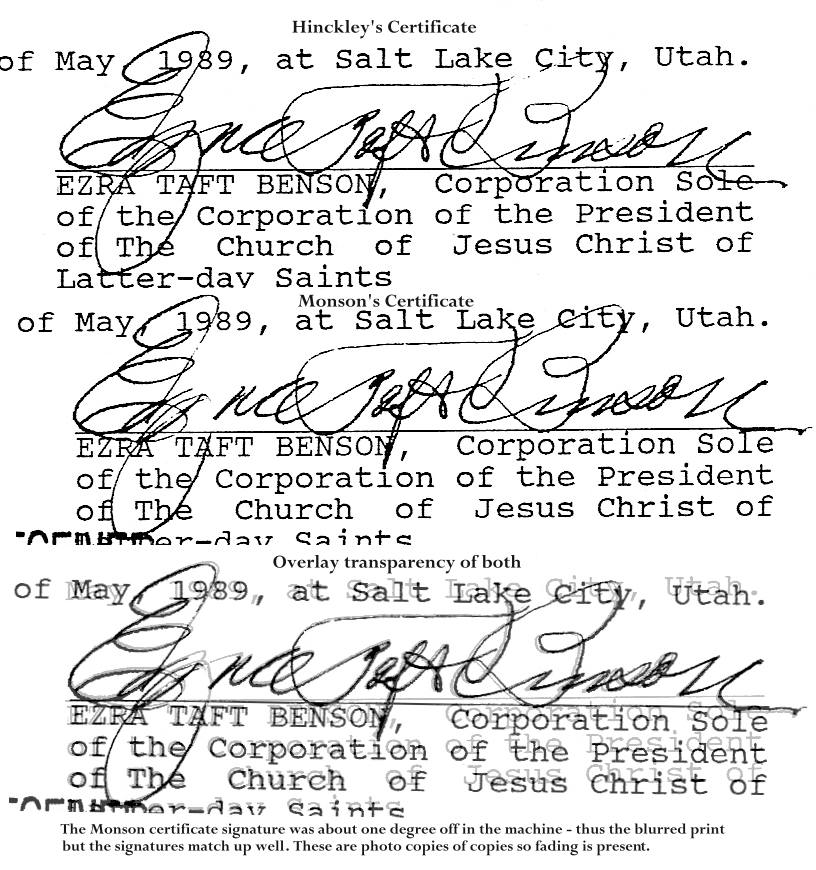
At this writing 12/30/2006 it appears Hinckley retains most of his mental capacity, unlike Ezra Taft Benson who deteriorated mentally in his last years. We will know Hinckley's end is near when Monson, Faust or Packer file new certificates of authority with the Utah Department of Commerce Division of Corporations and Commercial Code.
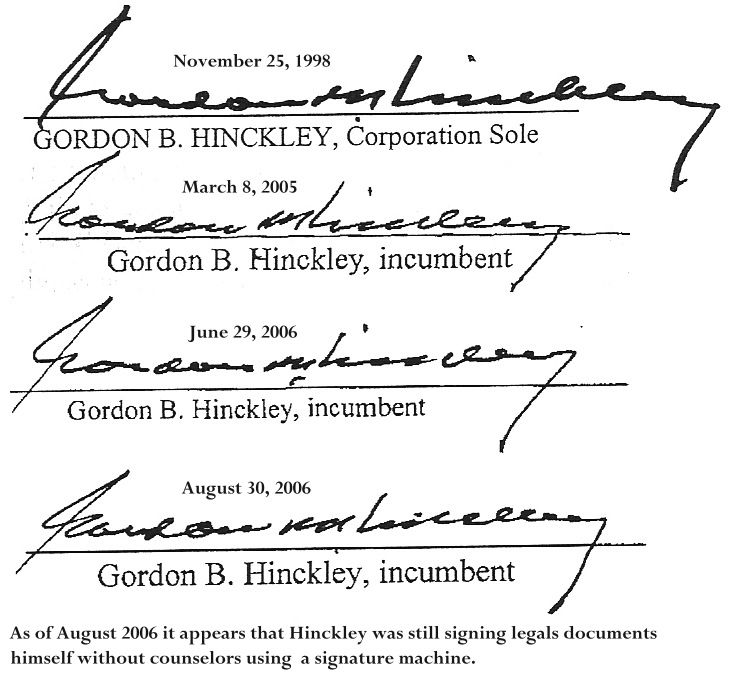
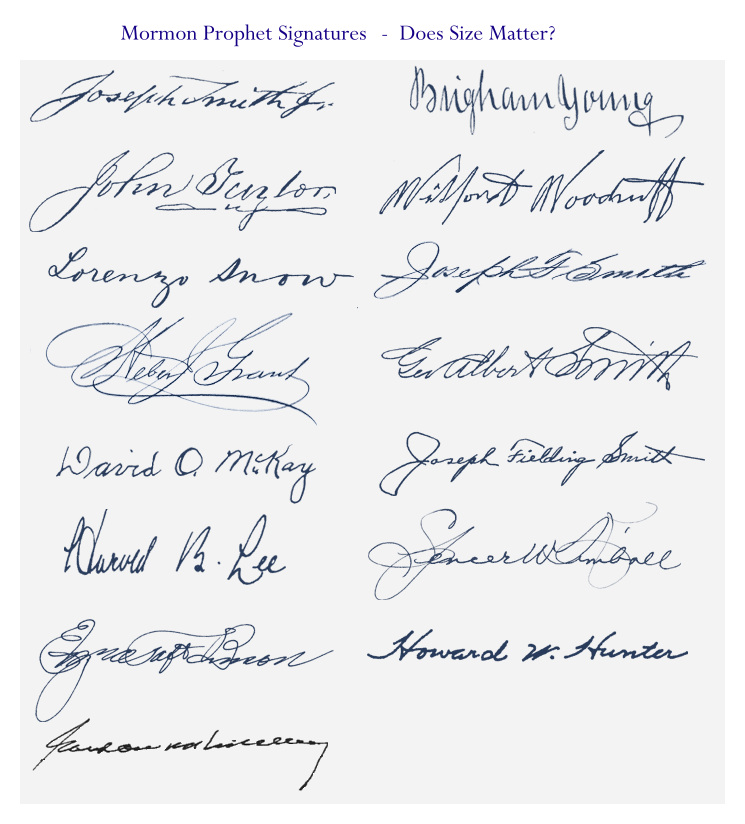
I have included the IRS circular on the subject at the bottom.
The LDS Church is required to provide a short "information" return which discloses the income from for-profit subsidiaries and information about specific activites(form 990-T, 990-W). There is no other reporting required for a "Church" 501(c)(3). A Church (as opposed to a religious organization) is not required to file a 990.
Here is the IRS definition of a Church and religious organization:
The term church is found, but not specifically defined, in the Internal Revenue Code (IRC). The term is not used by all faiths; however, in an attempt to make this publication easy to read, we use it in its generic sense as a place of worship including, for example, mosques and synagogues. With the exception of the special rules for church audits, the use of the term church throughout this publication also includes conventions and associations of churches as well as integrated auxiliaries of a church.
Because special tax rules apply to churches, it is important to distinguish churches from other religious organizations. Therefore, when this publication uses the term “religious organizations,” it is not referring to churches or integrated auxiliaries. Religious organizations that are not churches typically include nondenominational ministries, interdenominational and ecumenical organizations, and other entities whose principal purpose is the study or advancement of religion.
Exceptions to file 990
The following is a list of some of the organizations that are not required to file Form 990.
-- churches (as opposed to “religious organizations,” defined earlier)
-- inter-church organizations of local units of a church
-- mission societies sponsored by or affiliated with one or more churches or church denominations, if more than half of the activities are conducted in, or directed at, persons in foreign countries
-- an exclusively religious activity of any religious order
http://www.irs.gov/pub/irs-pdf/p1828.pdf
There is no tax reporting by The Church of Jesus Christ of Latter-day Saints
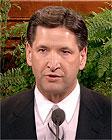 Church Auditing Department Report, 2005
Church Auditing Department Report, 2005
Presented by Robert W. Cantwell
Managing Director, Church Auditing Department
To the First Presidency of The Church of Jesus Christ of Latter-day Saints:
Dear Brethren: As prescribed by revelation in section 120 of the Doctrine and Covenants, the Council on the Disposition of the Tithes authorizes the expenditure of Church funds. This council is composed of the First Presidency, the Quorum of the Twelve Apostles, and the Presiding Bishopric. This council approves budgets for Church departments and operations. After receiving the council's authorization, Church departments are to expend funds consistent with approved budgets and in accordance with Church policies and procedures.
The Church Auditing Department has been granted access to all records and systems necessary to evaluate the adequacy of controls over receipts of funds, expenditures, and safeguarding of Church assets. The Church Auditing Department is independent of all other Church departments and operations, and the staff consists of certified public accountants, certified internal auditors, certified information systems auditors, and other credentialed professionals.
Based upon audits performed, the Church Auditing Department is of the opinion that, in all material respects, contributions received, expenditures made, and assets of the Church for the year 2005 have been recorded and administered in accordance with appropriate accounting practices, approved budgets, and Church policies and procedures.
Respectfully submitted,
Church Auditing Department
Robert W. Cantwell
Managing Director
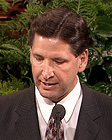 Church Auditing Department Report, 2004
Church Auditing Department Report, 2004
Presented by Robert W. Cantwell
Managing Director, Church Auditing Department
To the First Presidency of The Church of Jesus Christ of Latter-day Saints
Dear Brethren: The Auditing Department of the Church is independent of all other Church departments and operations and has been granted access to all records and systems necessary to evaluate the adequacy of controls over receipts and expenditures of funds and the safeguarding of Church assets. The auditing staff consists of certified public accountants, certified internal auditors, certified information systems auditors, and other credentialed professionals.
As prescribed by revelation in section 120 of the Doctrine and Covenants, the Council on the Disposition of the Tithes authorizes the expenditure of Church funds. This council is composed of the First Presidency, the Quorum of the Twelve Apostles, and the Presiding Bishopric. After receiving authorization to expend Church funds, Church departments administer approved budgets and expend funds in accordance with Church policies and procedures.
Based upon audits performed, the Church Auditing Department is of the opinion that, in all material respects, contributions received, expenditures made, and assets of the Church for the year 2004 have been administered and recorded in accordance with appropriate accounting practices, approved budgets, and Church policies and procedures.
Respectfully submitted,
Church Auditing Department
Robert W. Cantwell
Managing Director
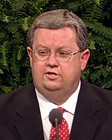 Church Auditing Department Report, 2003
Church Auditing Department Report, 2003
Presented by Wesley L. Jones
Managing Director, Church Auditing Department
To the First Presidency of The Church of Jesus Christ of Latter-day Saints
Dear Brethren: The Church of Jesus Christ of Latter-day Saints maintains an auditing department, which performs its work independently from all other Church departments and operations. The managing director of the Church Auditing Department reports directly and regularly to the First Presidency. Church Auditing Department staff consist of certified public accountants, certified internal auditors, certified information systems auditors, and other credentialed professionals.
By charge from the First Presidency, the Church Auditing Department has authority to audit all Church departments and operations worldwide. The Church Auditing Department has access to all systems, records, personnel, and properties necessary to audit contributions, expenditures, and Church resources. Professional financial and operational auditing standards govern the performance of audit work. Risk is the primary factor guiding the selection of audits.
The Council on the Disposition of the Tithes is responsible for, and for the year 2003 authorized, the expenditure of Church funds. This council is composed of the First Presidency, the Quorum of the Twelve Apostles, and the Presiding Bishopric, as prescribed by revelation. Under direction of this council, accountability for contributions, expenditures, and Church resources is controlled through each department's management group and through the Church's Budget and Finance Departments. Administration of funds by these management, budget, and finance groups is audited and reported.
Based upon our audits, the Church Auditing Department is of the opinion that, in all material respects, contributions received, expenditures made, and Church resources used during the year 2003 have been administered in accordance with approved budget guidelines and established Church policies and procedures.
Financial activities of Church-affiliated organizations, which are operated separately from the Church, were not audited by the Church Auditing Department in 2003. Independent public accounting firms audited the financial statements and corresponding controls in these organizations. These organizations include, among others, Deseret Management Corporation and its subsidiaries and the Church's institutions of higher education, including Brigham Young University. Nevertheless, the Church Auditing Department did verify that appropriate reporting of these public accounting firms' audit results occurred with each organization's audit committee.
Respectfully submitted,
Church Auditing Department
Wesley L. Jones
Managing Director
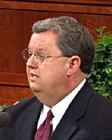 Church Auditing Department Report 2002
Church Auditing Department Report 2002
Presented by Wesley L. Jones
Managing Director, Church Auditing Department
To the First Presidency of The Church of Jesus Christ of Latter-day Saints
Dear Brethren: The Church of Jesus Christ of Latter-day Saints maintains an auditing department, which performs its work independently from all other Church departments and operations. The managing director of the Church Auditing Department reports directly and regularly to the First Presidency. Church Auditing Department staff consist of certified public accountants, certified internal auditors, certified information systems auditors, and other qualified, credentialed professionals.
By charge from the First Presidency, the Church Auditing Department has authority to audit all Church departments and operations worldwide. The Church Auditing Department has access to all records, personnel, properties, and systems needed to audit Church contributions, expenditures, and resources. Professional auditing standards govern the performance of audit work. Risk is the primary factor guiding the selection of audits.
The Council on the Disposition of the Tithes is responsible for, and for 2002 authorized, the expenditure of Church funds. This council is composed of the First Presidency, the Quorum of the Twelve Apostles, and the Presiding Bishopric, as prescribed by revelation. Under direction of this council, contributions and expenditures were controlled through the Church’s Budget and Finance Departments. Administration of contributions received and budgeted expenditures was audited and reported.
Based upon our audits, the Church Auditing Department is of the opinion that, in all material respects, contributions received and funds expended during the year ended December 31, 2002, have been managed in accordance with approved budget guidelines and established Church policies and procedures.
The financial activities of Church-affiliated organizations, which are operated separately from the Church, were not audited by the Church Auditing Department in 2002. These organizations include, among others, Deseret Management Corporation and its subsidiaries and the Church’s institutions of higher education, including Brigham Young University. Independent public accounting firms audited the financial statements and corresponding control activities of these organizations. Nevertheless, the Church Auditing Department did verify that appropriate reporting of these firms’ audit results occurred with each organization’s audit committee.
Respectfully submitted,
AUDITING DEPARTMENT
Wesley L. Jones
Managing Director
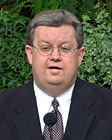 Church Auditing Department Report 2001
Church Auditing Department Report 2001
Wesley L. Jones
Managing Director, Church Auditing Department
To the First Presidency of The Church of Jesus Christ of Latter-day Saints
Dear Brethren: The Church of Jesus Christ of Latter-day Saints maintains an auditing department which performs its work independently from all other Church departments and operations. The managing director of the Church Auditing Department reports directly and regularly to the First Presidency. Church Auditing Department staff consists of certified public accountants, certified internal auditors, and other qualified, credentialed professionals.
Under the direction of the First Presidency, the Church Auditing Department has authority to audit all Church departments and operations worldwide. The Church Auditing Department has access to all records, personnel, properties, and systems needed to audit Church contributions, expenditures, and resources. Risk is the primary factor guiding the selection and performance of audits.
Expenditures of Church funds in 2001 were authorized by the Council on the Disposition of Tithes. This council is composed of the First Presidency, the Quorum of the Twelve Apostles, and the Presiding Bishopric, as prescribed by revelation. Expenditures are controlled through the Budget and Finance Departments under direction of the Appropriation and Budget Committees. Administration of approved budgets was audited and reported.
Based upon performance of our audits, the Church Auditing Department is of the opinion that, in all material respects, contributions received and funds expended during the year ended 31 December 2001 have been managed in accordance with approved budget guidelines and established Church policies and procedures.
The financial activities of Church-affiliated organizations, which are operated separately from the Church, were not audited by the Church Auditing Department in 2001. These organizations include Deseret Management Corporation and its subsidiaries and Brigham Young University and other institutions of higher education. However, financial activities in these organizations were audited by independent public accounting firms. In addition, the Church Auditing Department did verify that appropriate reporting of these audit results occurred with each organization's audit committee.
Respectfully submitted,
AUDITING DEPARTMENT
Wesley L. Jones
Managing Director
To comment on a comment:
It seems a little bit like a 'sweeping generality' to say that a person's signature 'always' indicates how one wishes to be perceived. That, to me, says, "Everyone is vain and is only interested in [them]self."
I, personally, don't think the assessment is correct. There are some who might 'wish' to be seen as 'plain and ordinary'. On the other hand, there are signatures that can easily be seen as not contrived (nor 'subconsciously contrived', either, for that matter).
There are honest, genuine, unpretentious, plain, ordinary, regular people whose signatures are not 'looking for approval' (nor for any other vain contrivance).
So, perhaps, the word 'always' would serve a wider readership if it were changed to 'often' or 'quite often' (among other possible choices). - 04/08/2008 - skercrow
"A person's signature always indicate how they want thte world to perceive them."
Really? I would have guessed a person's signature had more to do with their general handwriting or calligraphy. Grant, and possibly others, was trained to write beautifully, and his signature is very beautiful.
All of these men learned to write in a time when penmanship was much more important than it is now. The widespread use of typewriters, followed by computers, has effectively kept the rest of us from learning to write and sign our names as beautifully as these men. Considering this, I hardly think any of these signatures "jump off the page" when compared to each other. - 05/23/2007 - Steve
I'm stil an active, happy lds gal. btw, thank you for the compliment to my husbands' relative pres. howard w. hunter. you are very perceptive, he was a kind, down-to-earth man, although there was very little that was "average" or "regular" about his genius, but his mannerisms put people at ease whether gov't, family or lds.
I enjoy time to time visiting salamander cause some of this stuff is quite funny! (not this page, this was kinda boring).
so the Church protects itself from being dispossessed like the late 1800's, what is wrong with incorporation? my husband is a loving doctor, but still incorporated his work and LLC'd it to protect himself.I feel better now that I've seen these documents because they make me feel the Church is smart enough to protect itself from the "hearts of conspiring men".
Anyway, hope athiesm is still working for you~i still would like you to respond to last years post on how you think the universe and gallaxies came to be "spontaneously" if there's no Creator - 04/11/2007 - love Kittywaymo
A person's signature always indicate how they want thte world to perceive them.
For instance, some of the signatures are underlined, which means that the person wanted to appear as very important. It's quite interesting that Hunter's signature is different from all the rest, except for Lorenzo Snow. Hunter wanted to appear as just a regular guy. A signature does not indicate the true character of a person. That can only be found by careful study of at least an entire page of text, preferably more, as certain trends which show over and over again are indicative of particular personality traits. I do find it interesting that B.Y.'s signature jumps off the page as indicative that he wanted others to know that his word was law. One can almost imagine him pounding on the podium putting his followers in their place. - 01/01/2007 - anon for now